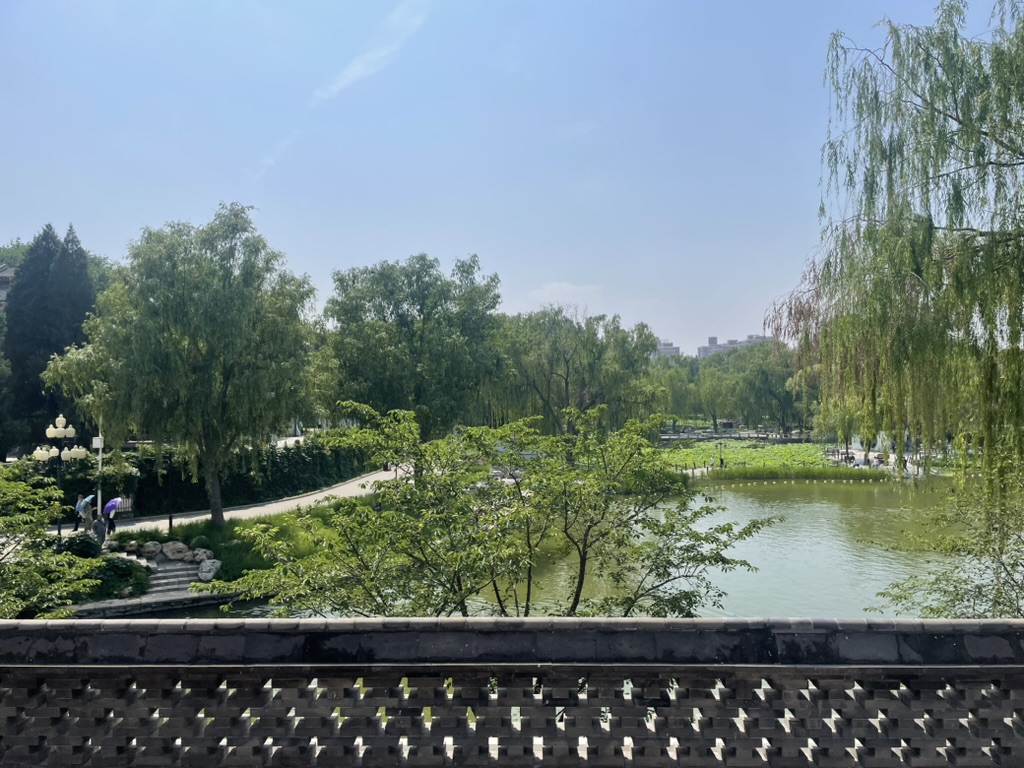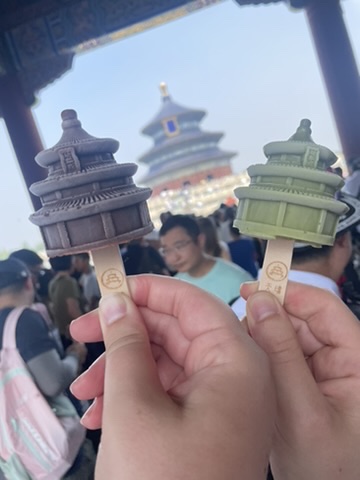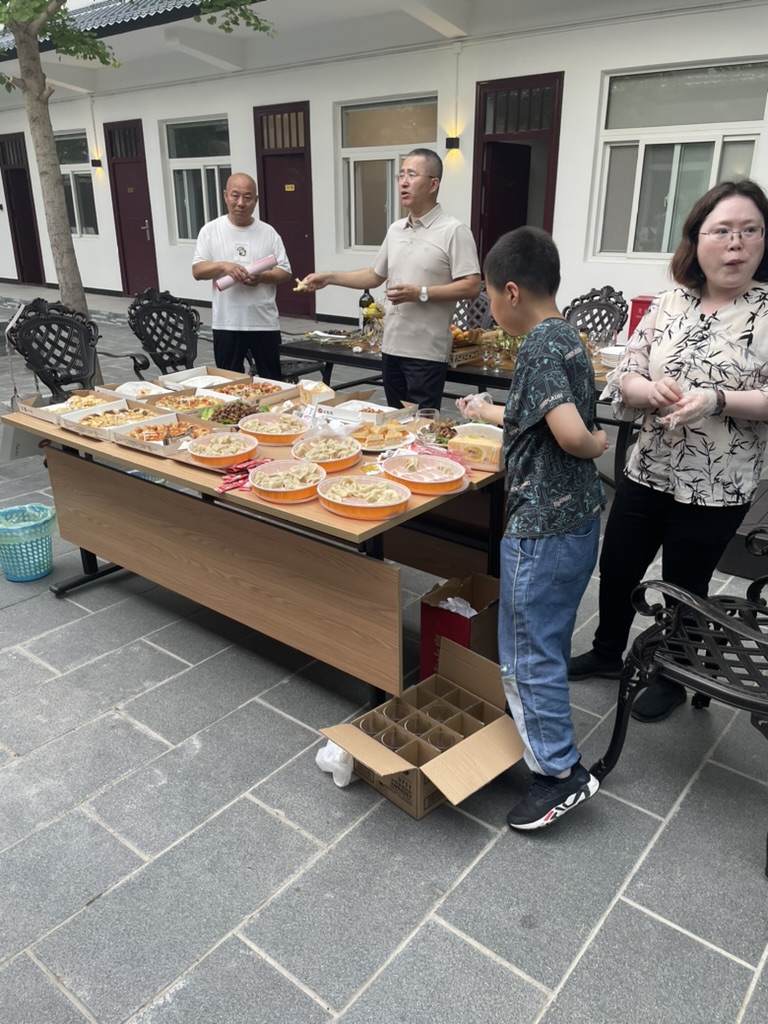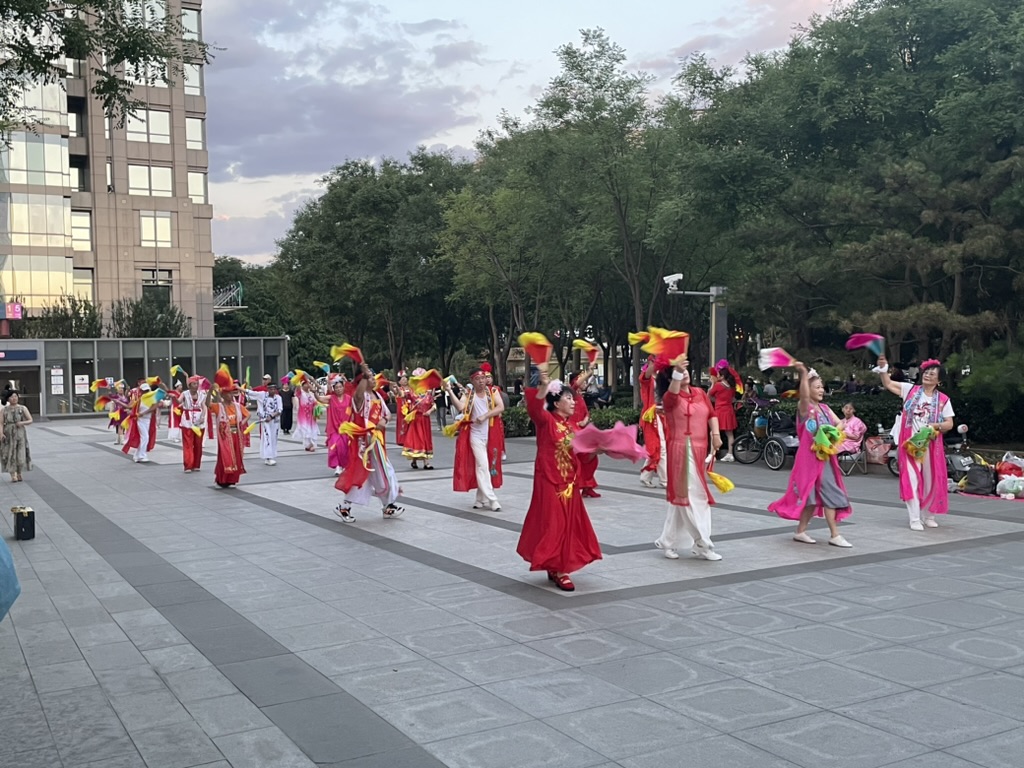Week Three
This week, Lily and I enjoy our three-day weekend, endure the hottest day in Beijing so far, and I welcome my parents to the city!
After Lily’s session with Kevin in the morning, we decide to look for some of the events for the Dragon Boat Festival at a nearby park. The Dragon Boat Festival is a traditional Chinese holiday to commemorate a Chinese poet through eating sticky rice dumplings and racing dragon boats (long rowboat with a dragon head at the front). We first head to Taoranting Park (陶然亭公园)  where we’re greeted by gorgeous rolling hills and large swaths of weeping willows. This park’s origins can be traced back to the Qing Dynasty to 1695. We find the booths that sell traditional pendants worn with threads of silk that are believed to keep evil away along with other Chinese trinkets. Lily and I wave off one tenacious seller who yaps at us in rapid Chinese with multiple “thank you”s and “goodbye.” We also stumbled upon Taoranting Cibei Nunnery which was the meeting site for Mao Zadong and other members of the of the progressive group, the Furen Association. It hosts a permanent exhibit regarding revolutionary activities in early 20th Century China. After Taoranting, we headed to another park, this time the Longtan Park (龙潭湖公园), which translates to “Pool of the Dragon.” This park hosts a massive kids park, so as we walked down the gorgeous path near a large lake, we could hear the squeals of children’s laughter. That evening, we decided to try to find one of the local night markets, deciding on Guijie Street. Guijie Street, also known as “Ghost Street,” got its name from the lanterns local merchants would light in the evening till early morning as they sell various fruits, vegetables, and other goods. This light gave a ghostly effect, causing the nickname among locals which stuck through its transformation from a trading street to a food scene. Guijie mostly consists of restaurant after restaurant boasting delicious meats and bustling activity.
where we’re greeted by gorgeous rolling hills and large swaths of weeping willows. This park’s origins can be traced back to the Qing Dynasty to 1695. We find the booths that sell traditional pendants worn with threads of silk that are believed to keep evil away along with other Chinese trinkets. Lily and I wave off one tenacious seller who yaps at us in rapid Chinese with multiple “thank you”s and “goodbye.” We also stumbled upon Taoranting Cibei Nunnery which was the meeting site for Mao Zadong and other members of the of the progressive group, the Furen Association. It hosts a permanent exhibit regarding revolutionary activities in early 20th Century China. After Taoranting, we headed to another park, this time the Longtan Park (龙潭湖公园), which translates to “Pool of the Dragon.” This park hosts a massive kids park, so as we walked down the gorgeous path near a large lake, we could hear the squeals of children’s laughter. That evening, we decided to try to find one of the local night markets, deciding on Guijie Street. Guijie Street, also known as “Ghost Street,” got its name from the lanterns local merchants would light in the evening till early morning as they sell various fruits, vegetables, and other goods. This light gave a ghostly effect, causing the nickname among locals which stuck through its transformation from a trading street to a food scene. Guijie mostly consists of restaurant after restaurant boasting delicious meats and bustling activity.
Sunday we took it relatively easy. I taught Kevin in the morning. That late afternoon, we decided to try the Xinjiang Crescent Moon Restaurant, a Uighur restaurant located about 20 minutes from us where I had the most delicious food of my summer so far. The restaurant was tucked away in a tiny alley off the main road, but once we arrived, we could immediately tell the hidden oasis was the restaurant we were looking for. Most shopkeepers handle us with training gloves at first, coming out with a physical menu and a note pad so we can write down what we want until they realize we’re able to scan the QR code and order that way. On the way back from the restaurant, we swung into a little, hipster coffee shop where we both accidentally ordered cold brew coffee at 6pm.
On our Monday off for the holiday, we decided to visit another legendary site, the Temple of Heaven. We discovered this World Heritage Site was only a 10-minute walk from our apartment so we high-tailed it over there Monday morning. The Temple of Heaven is a collection of buildings on a massive spread of greenery and gardens. There is the Hall of Prayer for Good Harvest, which is the most iconic building of the bunch and what is pictured below, the Fasting Palace, and the Imperial Vault of Heaven. We walked around the site, taking stops to absorb these massive testaments to architecture achievement. We, of course, also had to get the Hall of Prayer for Good Harvest ice cream.

The day was hot, but we were able to cool off by walking through the wooded area on a path created by many who had come before us. When we got back to our (beautiful, gorgeous, fabulous, very thankful for) air-conditioned apartment, Lily and I both promptly fell asleep into long, much-needed naps.
The work week started how the city of Beijing moves - quickly. Tuesday morning, we met three new interns. Two of the young women attended and graduated from the Capital University for Political Science and the young man was in his junior year at a local international high school. The two young women both plan to/have taken the LSAT and attend law school in the United States. During lunch, they had questions about the law school atmosphere and whether their future classmates were really as competitive and cutthroat as law students’ reputation usually is. We assured them that most law students are cooperative, helpful, and overall likeable and interesting people (with the caveat there may be some you don’t get along with).
We continued our project on putting our research into juvenile’s internet use on juvenile delinquency into one coherent project, stopping to note where the comparative analysis into Chinese youths would fit as well. There were certainly some language barriers as we tried to explain our logical thinking. At this time, there is no conclusive research that links juvenile internet use to an increased or decreased likelihood of juvenile delinquency behavior. Thus, our research took us into a roundabout way of linking the two concepts. First, we discussed the statistics and data on juvenile use of the internet on mental health and overall aggressive and violent tendencies. Then, we discussed how mental health issues and aggressive behaviors are linked to juvenile delinquency behavior. In very simple terms: Juvenile internet use -> Mental Health issues + Aggressive tendencies = Juvenile Delinquency Behavior. However, this mental jump was a little confusing for those who hadn’t been in the weeds of the data like us.
Another element of my week was reading and translating/editing the research project of child internet stars from Chen. This data reiterated everything we had discussed in the meeting while also explaining the current state of Chinese law regarding the subject and how it can be improved to protect these children from exploitation from their families and entertainment media corporations. Microsoft Translate is also not entirely accurate, so I used several sources to edit the document into passable English. This report is likely only to be seen by government officials as it was commissioned by the Office of the Working Committee on Women and Children of the State Council, but I figured it can’t hurt to have an English version on hand.
I also worked on more consultations from Ms. Li. This time, the consultations asked about a defamation suit from a child, plagiarism accusations from a student’s teacher, a custody dispute regarding a 2-year-old and their mother, an abusive classmate who suffers from a mental disorder, and neglect from a teacher regarding a child’s health and safety. Writing the differences on how these situations would be handled in Chinese and American law is actually unbelievably fascinating research. As the Chinese system follows Civil Law, the statutes are easy to read and fairly straightforward. There are some vague elements that cause a bit of confusion, such as: Article 25 on the Protection of Minors states “Schools shall comprehensively implement state policy on education, foster virtue through education, conduct character education, enhance the quality of education, pay special attention to cultivating minor students’ cognitive abilities and ability to cooperate, innovate, and implement, and promote their overall development” which is not entirely helpful when determining if a teacher falsely accusing a student of plagiarism violates this article. However, this regulation of schools nationwide vastly differs from the United States that typically leaves these kinds of policies to the individual schools. Upon looking into the policies of these individual schools, I’ve found the standards there are equally vague.
Thursday evening, we had an official welcome party to celebrate the new office. We had pizza, dumplings, fruit, and plenty of drinks to be shared by all. I was excited when I heard there was going to be pizza, picturing the American pizzas from back home or the Italian pizzas I’d had my semester abroad, however, the reality was a bit more humorous. Despite the familiar logo on the outside of the boxes, Pizza Hut is apparently a very fancy sit-down restaurant in Beijing, the content of the boxes was anything but familiar. There were pizzas with fruits and cream cheese stuffed into the crust and others with whole sausage wiener dogs and egg in the crust. The way the food was shared was also quite interesting. Instead of plating the pizzas, we all grabbed plastic gloves and used those to grab and eat whatever struck our fancy. Of course, several people still plated their meals, but overall, you mostly saw people with a drink in one hand and a slice of pizza in the other, plastic-gloved, hand. Director Tong was also excited to hand out glasses of French wine he had purchased from a wine seller in Shanghai. I warned him I was a bit of a wine snob (Thank you Massimo from my Exploration of Wine Culture class in Italy), but the red wine ended up being a gorgeous blend of cherries, oak, and vanilla. We ended up talking and laughing with our colleagues until late into the evening before all parting off to our separate ways.
Friday I concluded my analysis into the consultations and sent them to Ms. Li to look over. She obviously has the Chinese law down, but she takes a little longer to review and research into the American legal analysis of the consultations. Gan Lu, Ms. Li, Jiang, Lily and I also had a meeting in the morning to discuss the three sets of consultations we had done over our three weeks here. At least, that was our intention. We spent about two hours discussing the first prompt, discussing the differences between criminal and civil cases, jury trials, and the sentencing policies. Lily and I explained that in the United States criminal cases must proceed and conclude prior to civil cases because of the right to not self-incriminate. However, that is not the case in China. Most of the time, the civil case is a subsidiary of the criminal case – meaning the two proceed as one and the victim of the crime is actively involved in both cases. The reason a lot of victims will do this is to save money on litigation costs. If it proceeds separately than the criminal case, they will be responsible for any legal fees and the cost of litigation. They also explained that victims are a large part of the decision the judge will make when it comes to sentencing. Prior to or during the criminal case proceedings, the victim and defendant will engage in a mediation. There, there will be conversations regarding potential compensation for the victim for any medical bills or for counseling as well as a formal expression of apology from the defendant. If the defendant manages to receive a letter of forgiveness from the victim and can show there is a larger offer of compensation on the table, their sentence may be reduced up to 40% of what the sentence would be without it. They were very surprised to find out that a criminal case may proceed without the victim’s cooperation. We also spent quite a bit of time on discussing trial by jury, confirming how the selection process is made, the reasons a juror may or may not be dismissed, and how long it takes. Ms. Li noted the only comparable system in China is the People’s Jurors of China. This is a voluntary organization typically made up of educators, doctors, and now-retired legal professionals. They will assist in a case at the request of the judge; however, most cases are decided by a panel of three to seven judges. As the two hours came to a close, we all smiled and laughed at how long we had just spent conversing about the two legal systems and their similarities and differences. Engaging in these types of discussions have probably been my favorite part of the internship, the honest and truthful exchange of ideas globally would show many that we’re really not so different.
Friday evening, I attempted to find an American restaurant I had found online. Once I arrived, however, I realized the listing was a little misleading and there were no American offerings. Disheartened I could not get a burger like I had been craving, I instead decided to walk down the street. Lily and I joke every time we explore a new area of Beijing, we’ve “unlocked” another part of the city (like you do in video games). I ducked into another shop for dinner, ordering my food on a kiosk and then waited for my noodles, skewers of chicken, and sweet taro balls. My favorite type of restaurants are the ones with lots of pictures on the menu so I can go by sight instead of having to translate everything.

On the way back to the subway station home, in the courtyard of the park, there were a large group of dancers wearing shades of red and white dancing, holding a red, orange, and yellow fan. This was obviously an uncommon sight as many had stopped to walk the dancers.
As I watched the group, I couldn’t help the massive grin on my face. To be honest, I had been struggling with the culture shock of coming to a completely foreign country where I neither spoke the language nor could decipher the characters. However, watching those dancers in the crowd of people, I finally felt the absolute glee to be in a completely different country with a completely different culture. I’m excited to get out and ‘unlock’ more of this diverse and exciting city!
This weekend, my parents arrive in Beijing! I hope to take them to see several sites and explain this new and exciting city to them. They will be here a week before moving on with their tour of China.